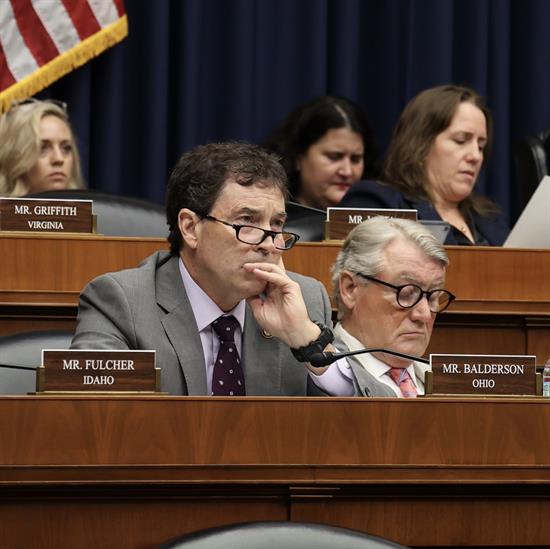Energy and Commerce Committee Approves Two Balderson Grid Reliability Bills
Washington,
June 25, 2025
WASHINGTON, DC – Two key pieces of legislation led by Congressman Troy Balderson (OH-12) to strengthen America’s electric grid reliability cleared a major legislative hurdle today, receiving approval from the House Energy and Commerce Committee.
The Reliable Power Act and the GRID Power Act both aim to boost the reliability and stability of America’s electric grid while keeping electricity affordable for families and businesses. As power demand in Ohio and across the nation grows at a historic pace, the grid will require more dispatchable baseload energy to avoid rolling blackouts and power shortages. “As one of the most resource-rich nations on the planet, it's easy to take dependable electricity for granted—but our grid's reliability is far from guaranteed,” said Balderson, who serves on the Energy and Commerce Committee and chairs the House Energy Action Team (HEAT). “Ohio families deserve access to affordable and reliable power. Whenever they flip a switch, they expect the lights to turn on every time. With the Reliable Power Act and GRID Power Act, we will be able to hold regulators accountable and give grid operators the tools they need to meet rising energy demand and power America’s bright future.” “American families and businesses rely on the abundant and affordable power we produce here at home,” said Energy and Commerce Committee Chairman Brett Guthrie. “The legislation advanced today will help us meet our energy goals of securing our grid, bringing more baseload power online, and powering the data centers we need to win the race for AI. Thank you to Chairman Latta, and all the members who have worked on these bills that will help provide the energy we need.” Reliable Power Act The Reliable Power Act, unveiled by Balderson last month at an energy roundtable in Lancaster, Ohio, would require federal agencies to assess and mitigate the impact of any proposed regulations on the stability of the electric grid before those regulations are finalized. Under the legislation, the Energy Reliability Organization (ERO) must conduct annual long-term assessments identifying threats to grid reliability—specifically those arising from pending federal rules. If a proposed regulation is flagged as a risk, the Federal Energy Regulatory Commission (FERC) would coordinate with the relevant agencies to mitigate potential impacts. If the agency fails to resolve the issue, the rule would not proceed. GRID Power Act Also approved by the committee was the Guaranteeing Reliability through the Interconnection of Dispatchable (GRID) Power Act, legislation Balderson has championed since last fall. The bill aims to address growing wait times in the nation’s energy interconnection queue—delays driven by a surge of projects seeking to capitalize on Biden-era “green” energy credits. These projects, which now make up 97% of all projects in the queue, tend to be weather-dependent and cannot be dispatched at a moment’s notice to meet consumer energy needs. When reintroducing the bill this Congress, Balderson partnered with Senators John Hoeven (R-ND) and Todd Young (R-IN), who introduced companion legislation in the Senate. PJM, the largest grid operator in the nation, recently announced it expects to lose about 40 gigawatts of generation by 2030—21 percent of its total capacity. According to PJM, new power resources are not coming online quickly enough to offset the risk posed by retiring resources. The bill would allow grid operators to identify and fast-track projects that can provide dispatchable power, meet baseload demands, and improve grid reliability, reducing wait times from up to five years to under 12 months.
|
Press Releases
Stay connected
Enter your information to get the latest updates via our newsletter
The latest
-
This article was originally published by the Cleveland Plain Dealer. By Sabrina Eaton WASHINGTON – The U.S. House of Representatives on Wednesday passed legislation by Zanesville R...
-
WASHINGTON, D.C. – Today, the House of Representatives passed the Reliable Power Act, introduced by Congressman Troy Balderson (OH-12). This legislation protects America’s electric...
-
WASHINGTON, D.C. – Congressman Troy Balderson (OH-12) joined President Donald Trump and Transportation Secretary Sean Duffy in the Oval Office today for the announcement of the “Fr...
-
WASHINGTON, D.C. – Congressman Troy Balderson (OH-12) today introduced legislation to streamline America’s energy projects by ensuring a project can move forward without being trap...


